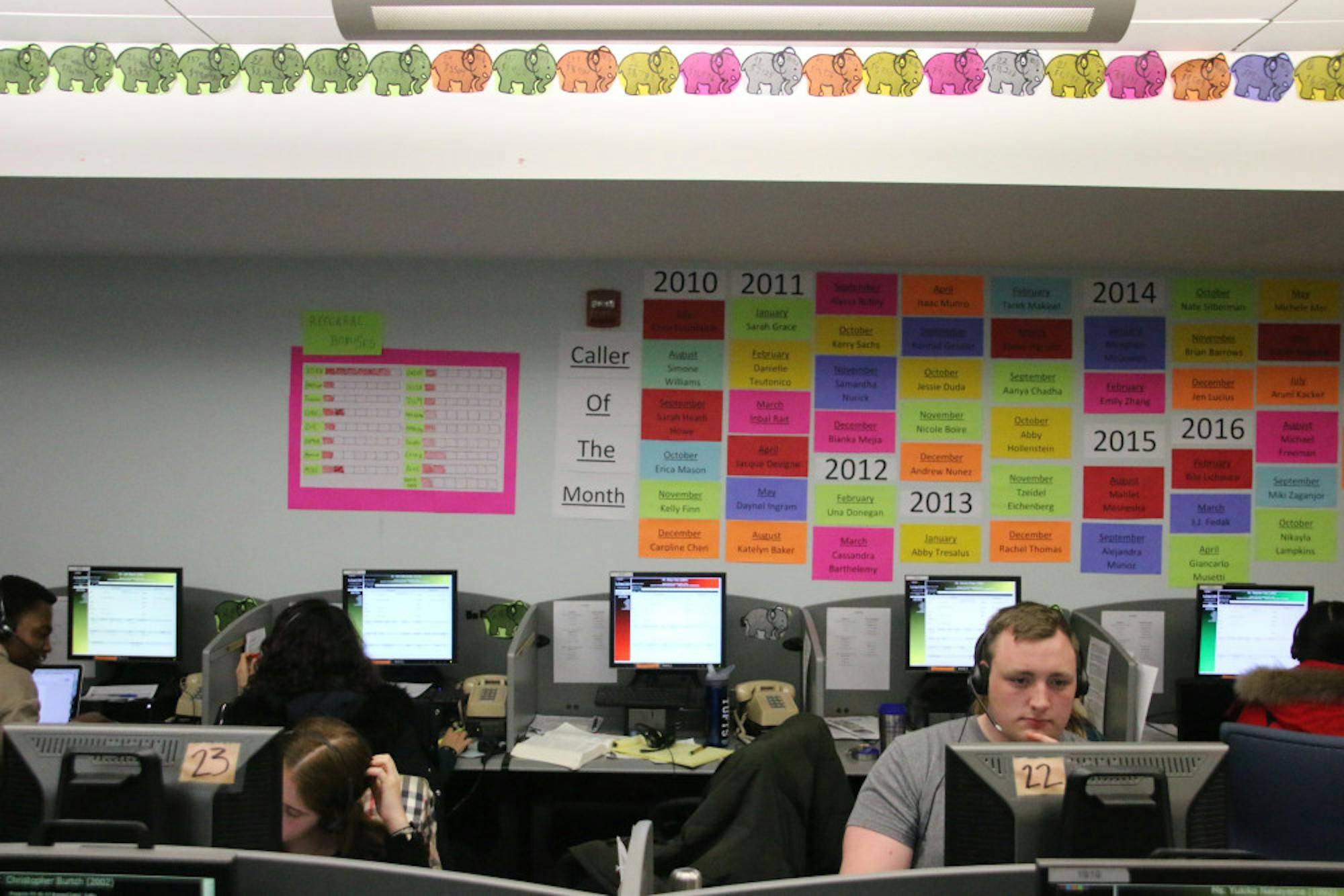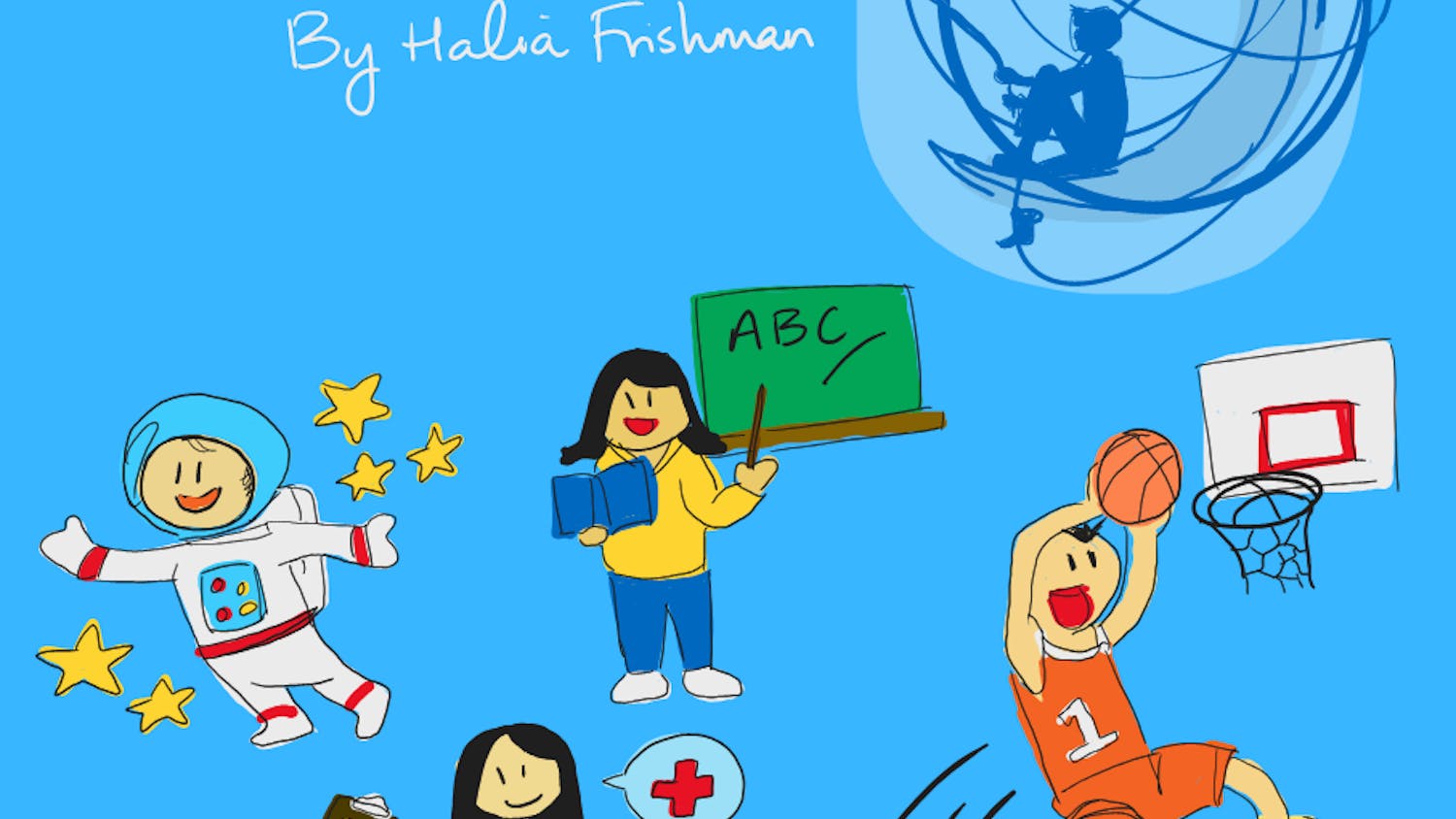Despite the prominent advertisements aimed at recruiting students to join Tufts Telefund, many students are unfamiliar with how the organization works.
Tufts Telefund Manager Justin Levin said that Telefund works with the university to fund different aspects of student life, including financial aid, clubs and sports teams. The organization does so by hiring undergraduate or graduate students to call alumni, as well as parents and friends of the university on occasion, to ask for donations.
Although the Telefund office is located on campus in the basement of Eaton Hall, the job is considered off-campus employment because the organization is run by an outside company, Ruffalo Noel Levitz (RNL). According to its website, the company provides “technology-enabled services, software and consulting for higher education enrollment management and fundraising."
Levin said that the focus of Telefund's work is fundraising specifically for Tufts student activities and financial aid.
“This is something that happens not just at Tufts, but at almost every university. This is how the university raises money for student scholarships and activities," Levin said. "I think some prospects think we’re raising money to build a statue or something silly, but that’s not the case at all."
The starting salary at Telefund is $11 per hour, according to Luke Murphy, a senior and a current Telefund supervisor. Student employees, who are required to work at least nine hours per week, have expressed varying degrees of satisfaction with the expectations and the work environment of the job.
Sophomore Shyra Costas said that over time, she adjusted to the aspects of the job that initially made her uncomfortable.
"I've had a lot of friends who hated it, who hated their time there, thought it was too monotonous, and I understand because a lot of the complaints that my friends had were that it's a lot of pressure to be on the phone and ask someone for money," Costas said. That is just a very hard thing to get used to. Once I got over that fear part of it, because it was very hard talking to people at first ... I honestly loved the job."
Junior Walae Hayek, who worked at Telefund for the 2015-2016 academic year, said that the repetitiveness of the job is a common complaint among those who work there.
“Most students enjoy the environment but hate the repetitive calls or the stress of convincing someone to donate to Tufts and the pressure that comes with,” Hayek said. “Others just find the job unfitting. But I also know so many people who do enjoy and stay at Telefund. So it depends, I guess.”
According to Murphy, students are given scripts to read to callers, with each conversation depending on the potential donor.
“I’ll start with talking to them about their experience at Tufts, maybe their professional life, answer questions they have about the school," Murphy said. "But a lot of times, they’ll want to hear about you.”
Levin said that Murphy and the other supervisors typically train the new employees.
“I have my supervisors actually do all of the training," Levin said. "I feel like it’s better when other students learn from other students rather than myself because I oversee the more managerial side of it."
He added that while most of the people who pick up the phone are polite and sometimes happy to hear from Tufts, some individuals respond negatively to the Telefund's calls.
“That’s the hardest part of the job -- overcoming rejection," Levin said. "Ultimately, every call is different.”
In particular, he noted that the months before the 2016 presidential election were unusually difficult for callers because the impending election affected the dynamic between the callers and alumni.
“[Alumni] were unsure about their financial futures," Levin said. "Those are tough calls because the callers don’t share their political opinions over the phone."
But Murphy said he rarely encounters irritated alumni.
“The vast majority of people are very pleasant, and then you get a couple of people who say, ‘Oh, I don’t want to talk right now.’ For the most part, everyone is real nice,” Murphy said.
Murphy also said that working for Telefund can provide opportunities to network with alumni.
“We’ve had kids on the phone who have been offered jobs from the people they’ve called,” he said.
Another perk of the job, Murphy said, is the incentive-based games that the students play, wherein callers who successfully lock down certain types of donations can win prizes.
“We’ll usually play games based on performance, like if you get your gift on a credit card you move up the board, and if not, you move down," he said. "We also do a caller of the month, so they win a gift card. I think in March we’re giving away Celtics tickets."
According to Levin, prospective donors to Tufts are organized into three categories: alumni who have never donated before or have not donated in the last 20-25 years fall under acquisition, alumni who gave donations between the last two to five years ago but have not donated in the past year fall under the category of reacquisition and donors who have a history of giving to the university each year are called retention donors.
“For new callers, I usually put them in Arts and Sciences acquisition alumni, so what that means is they’re calling people who have never donated before who graduated from Tufts with a degree in the Arts and Sciences,” Levin said.
However, Costas, who worked at Telefund in the fall of 2015, said that she would have liked to make more calls with the individuals who had the potential for giving a higher donation. The monotony of only receiving small donations, she explained, could be broken by making calls to more generous and regular donors.
"We had some set-in alumni leadership callers ... leadership meaning ... people [who] would call very high donors," Costas said. "I was put in leadership now and then, but it was weird to go from leadership to doing $10 calls."
Murphy explained that student employees help direct the callers to the different parts of the university that they can donate to.
“We’re able to designate their money wherever they want it to go, so if they want to donate it to a particular department or club or sports team, we can do that for them," he said. "You’re having a conversation with them, but you’re also facilitating their gift. You’re there to make it easier for them.”
Levin noted that despite students' hefty academic and extracurricular commitments, many of them continue to make calls.
“I have supervisors who take five classes, and they’re in eight different clubs and Telefund is like the ninth thing they’re part of," he said. "They still manage to come here, so I like to be flexible with the students as long as they’re making the required calls each month."
Students discuss perks, difficulties of working for university calling center

Tufts students work at the calling center in the basement of Eaton Hall on Feb. 27.





